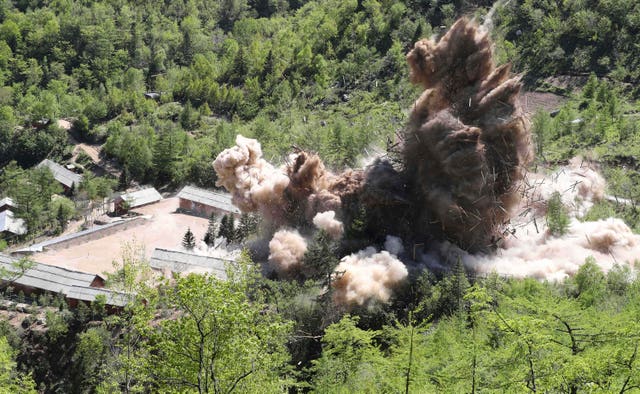Group urges radiation tests for 900 North Korean escapees
North Korea has rejected safety concerns surrounding its nuclear tests.

Human rights advocates have urged South Korea to offer radiation exposure tests to hundreds of North Korean escapees who had lived near the country’s nuclear testing ground.
Tests conducted by the South Korean government on 40 people in 2017 and 2018 found at least nine of them had abnormalities that could indicate high radiation exposure, but Seoul’s Unification Ministry said a conclusive link to North Korea’s nuclear activity could not be established and other factors were possible, such as age, smoking habits or other types of chemical exposure.
The South Korean radiation tests were subsequently discontinued.
The Seoul-based Transitional Justice Working Group cited the findings and its own analysis of geographic and census data to say North Korea’s six nuclear detonations could have spread radioactive materials by water within 24.8 miles of the Punggye-ri nuclear facility.
It said more than a million people live in the area dependent on groundwater and wells since piped water is scarce beyond the capital, Pyongyang and a few other cities.

It allowed foreign journalists to film the detonation of some tunnels at the site in 2018 but has never allowed international nuclear inspectors to visit the Punggye-ri testing ground.
Seoul’s Unification Ministry, which handles affairs with the North, said in a statement it will consider resuming the tests if the North Korean escapees have health problems or request examinations.
The advocacy group said South Korean records show nearly 900 people from the region around the Punggye-ri site have escaped to South Korea since the North’s first nuclear test in 2006. It said resuming radiation testing for them is crucial considering the lack of access to North Korea’s nuclear facility.
“North Korean escapees who display symptoms of radiation exposure must given accurate information and appropriate medical treatment,” said Ethan Hee-Seok Shin, a legal expert with the group. He also urged an independent investigation in North Korea based on the test results.
The advocacy group also urged South Korea, Japan and China to investigate the contamination risks of North Korean agricultural and seafood products. It said the area around the nuclear testing site is a food-producing region with abundant rainfall and a network of streams that lead to the sea.
South Korea and Japan have imposed bans for many years but the products are often smuggled and disguised as Chinese.
In 2015, Seoul’s Food and Drug Safety Ministry found high levels of radioactive cesium isotopes in North Korea-produced dried hedgehog mushrooms that were being sold as Chinese products.
Observers have said North Korea may be making preparations at the Punggye-ri site to conduct its seventh nuclear test and the first since September 2017.





